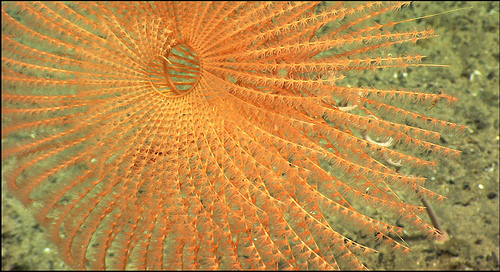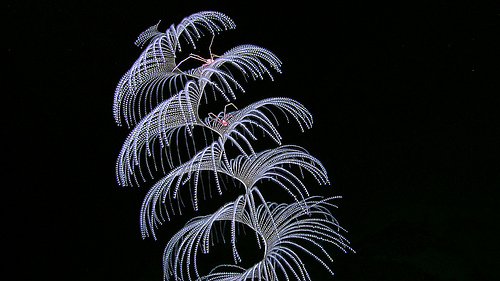深海是地球最後一塊淨土,但這塊淨土目前也已危機重重。陸地上的資源越來越少,深海工業的經濟價值就日漸增加,技術的進步讓人類得以進入深海鑽油、開採天然氣和貴金屬。科學家因此呼籲,應建立一套新的管理機制以保護深海環境。
潛藏無限資源 深海把關地球健康
深海的基因多樣性幾乎可說是無限大,可能藏有過去不曾發現過的全新材料或是未來的疾病治療方法,但若不加以保護,這些潛在資源便可能受到破壞或在人類發現前就消逝。
聖地牙哥斯克里普斯海洋學研究所海洋生物學家Lisa Levin認為,深海有碳封存和供養漁藏等重要功能,對於地球環境的健康至關重要。
適應需求擴大開採 深海生態壓力大
從事深海研究30年以上的Levin觀察,現今的地球人口是50年前的兩倍以上,從海洋獲取食物、能源和原料的需求也隨之升高,「大片深海海床成為租地,開採金屬結核、結殼、硫化物和富磷酸鹽物質以供應現今經濟的需求。」Levin說。
同時,二氧化碳排放量增加、海溫升高、食物供給改變、pH值和氧含量下降,都讓深海生態系的壓力越來越大。
「深海開採是一種權衡。我們開採所得的東西真的有比被開採破壞的東西重要嗎?有辦法稍微增加開發成本以減少生態破壞嗎?已被拖網捕撈和污染破壞的深海海床,又該如何修復?這些都是在工業活動超越科學知識之前必須解答的問題。」杜克大學尼古拉斯環境政策研究所海洋和沿海政策學系主任Linwood Pendleton說。
了解有限 管理困難但迫切需要
然而深海牽涉多個政治、地理疆界和學術領域,加上對於深海的瞭解有限,如何建立管理體系是一個複雜的難題。Pendleton說:「我們對於深海的認識非常有限,僅針對某些特殊地點有深入研究,但沒有人對於深海有整體性的瞭解,因此難以下決策和制定相關政策。」
另外,讓社會和各方利害關係人關注千里之外的深海面臨哪些問題,也不是件簡單的任務,尤其是手機、電子用品等社會上不可或缺的產品,都大量使用深海開採來的礦藏。
Levin認為,由於人類對深海漁藏、能源、礦藏和基因資源的剝削加劇,必須有一套跨國、跨經濟體和跨領域的管理體系才能維護深海的健康和完整。
「我們需要國際條約和法律主體以發展和監督深海管理,也需要來自多方的研究經費,以提供管理所需之科學資訊。這一切都需要串連多個領域,並讓各方利害關係者參與討論。」Levin說。
The deep ocean is Earth’s least explored environment, but that is rapidly changing. Scientists are calling for a new stewardship ethic as technological advances open the ocean deeps to the extraction of oil and gas, minerals and precious metals, and the dwindling supply of land-based materials creates economic incentives for deep sea industrialization.
The deep sea holds a nearly infinite amount of genetic diversity, some of which could provide novel materials or future therapeutics to treat human diseases, but if not protected, these could be disturbed or lost before humans discover them.
“We’re really in the dark when it comes to the ecology of the deep sea,” said Linwood Pendleton, director of the Ocean and Coastal Policy Program at the Nicholas Institute for Environmental Policy Solutions at Duke University. “We know a lot about a few places, but nobody is dealing with the deep sea as a whole, and that lack of general knowledge is a problem for decision-making and policy.”
Lisa Levin, a biological oceanographer at Scripps Institution of Oceanography in San Diego, believes the vital functions provided by the deep sea, from carbon sequestration to nurturing fish stocks, are key to the health of the planet.
As the human population has more than doubled in the past 50 years, demand for food, energy, and raw materials from the sea has risen with it, observed Levin, who has conducted research on the deep sea for more than 30 years.
“Vast tracts of deep seabed are now being leased in order to mine nodules, crusts, sulfides, and phosphates rich in elements demanded by our advanced economy,” she said.
At the same time, rising carbon dioxide emissions are exposing deep-sea ecosystems to additional stress from climate change impacts that include warmer temperatures, altered food supplies, and declining pH and oxygen levels.
As humans ramp up exploitation of deep-sea fish, energy, minerals, and genetic resources, a new “stewardship mentality” across countries, economic sectors, and disciplines is required, Levin said, for the future health and integrity of the deep ocean.
Knowing what kind of regulations to put in place is complicated by the fact that the deep sea crosses political, geographic, and disciplinary boundaries, and there is still much about deep sea systems that is unknown.
Levin said, “We need international agreements and an entity that can develop and oversee deep-ocean stewardship. We also need multiple sources of research funding that can help provide the scientific information that we need to manage the deep sea. All of this will require efforts that bridge several disciplines and engage stakeholders in these discussions.”
Engaging stakeholders and society in an issue that takes place miles from land and fathoms underwater can be a difficult task, especially in the face of economic arguments for mining the deep sea for materials used in products that society values, like cell phones and other electronics.
“Extraction from the deep sea is a tradeoff. Is the value of what we’re extracting greater than the damage?” Pendleton asked. “Are there ways to extract that might be more economically costly but have lower ecological impact? How can we repair the considerable damage that has already been done to the sea floor through trawling, pollution, and other practices? These are questions that we need to answer before industrial activity gets ahead of scientific understanding,” Pendleton said.
※ 全文及圖片詳見:ENS






